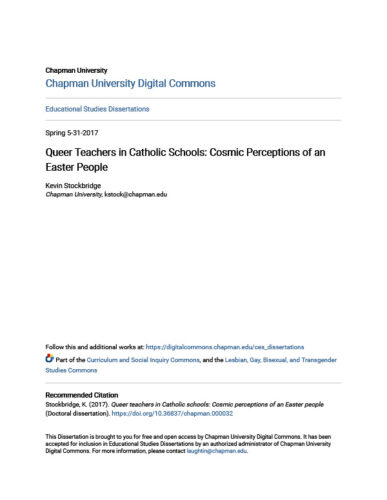My training in political theory comes in handy more often than one might think (and sometimes in surprising ways) when dealing with questions of theological ethics and moral theology. The term “ideology,” for example, has a technical meaning. It’s not necessarily important that everyone who uses the word understands the academic meaning of “ideology.” Not everyone needs to be a political theorist, God knows.
Yet, even without any sort of academic preparation, I think we know that “ideology” is a word that conveys strong associations. Frequently, the word is attached to something in order to convey a sense of danger.
The critic Edward Rothstein complained about an “ideology of democracy” when he suggested that the National Endowment for the Arts had lowered its standards by awarding grants widely to many artists. R.R. Reno, the editor in chief of the religious journal First Things, lamented an “ideology of inclusion” when he found fault in diversity initiatives. Eric R. Sammons, the editor in chief of Crisis Magazine, recently wrote against Pope Francis, accusing him of being ideological.
What is essential about an ideology is that it must be false.
And, of course, “gender ideology” has become a popular way to characterize conversations about LGBTQ people, as well as issues affecting women and sexuality more generally. Even Pope Francis has used it.
In all these cases, “ideology” is used to raise the stakes of the conversation. The word suggests something like what its technical meaning conveys—a steamroller of ideas coming right at us, threateningly and unswervingly, to change everything. Merriam-Webster affirms something of this sense of the word when it tells us “ideology” refers to “a systematic body of concepts especially about human life or culture.” Yet that dictionary definition only gestures toward the more dangerous reality of what an ideology is.
I spent several years studying the work of the German-born political theorist Eric Voegelin (1901-1985). After escaping arrest by the Gestapo for his writings against Nazi racial theories, Voegelin spent the rest of his life trying to understand what ideology was. Voegelin and a generation of 20th-century theorists tried to understand ideological movements like the one that overtook Germany, the political characteristic of what another theorist more recently called “the age of ideology.”
Ideologies as rejecting realities
Political life across the last three centuries has seen various ideological movements arise. Voegelin and other scholars found that those movements shared common traits.
What is essential about an ideology is that it must be false. That is to say, an ideology rejects the reality that does not correspond to an idea. An ideology begins with an idea that is contrary to reality, and then makes reality fit with that idea—which always demands force. Voegelin’s critical insight was to see parallels between modern ideological movements and the gnostic movements of the ancient world.
An ideology begins with an idea that is contrary to reality, and then makes reality fit that idea—which always demands force.
The gnostics were a diverse group, difficult to define. But one thing that characterized them was a belief that gnosis (knowledge) liberates us by helping us understand the world as it really is. Gnostics claimed to possess a kind of special knowledge—an idea—that set them apart from the rest of humanity.
When Voegelin considered the Nazis, he saw latter-day gnostics at work. The Nazis imagined a world that conformed to their ideas of racial purity. The application of force would hasten the arrival of the perfect world of their idea. Reality could be conformed to their ideology. The pattern reminded Voegelin of the Christian expectation of the coming reign of God, the eschaton. Paradise waits for Christians after the end of time.
In Voegelin’s somewhat turgid phrasing (popularized by William F. Buckley, Jr.), ideologues hoped to bring about a “fallacious immanentization of the Christian eschaton.” He simply meant that they sought to build their heaven on earth by any means necessary. In the ideologue’s gaze, paradise is only as far away as the application of force.
An ideology is a blueprint with which to reclaim reality from an unsatisfying reality that has been demolished. The history of the 20th century, especially, was written in the vast human costs of such ideological outbursts.
For these reasons, I think it is especially tempting for people who think of themselves as defending traditions to frame their anxieties in terms of ideology. Seeing every threat to how we understand the world as a systematic dismantling of reality is a reflex acquired during the 20th century, and it is especially native to a conservative frame of mind.
The reflex among Christians, especially some traditionalist Christians, to see ideology everywhere is not surprising. But rarely is it correct.
Voegelin was alert to a particularly Christian vulnerability to this sort of thinking. He located the origins of ideology in St. Paul’s encounter with the Risen Christ, the Christian “expectation of the Second Coming” that has a “long history of” anticipation and “disappointment.” The reflex among Christians, especially some traditionalist Christians, to see ideology everywhere is not surprising. But rarely is it correct.
The misuses of “gender ideology”
The term “gender ideology” offers us an interesting example of how “ideology” can be misapplied. Sonia Corrêa, the Brazilian-born feminist researcher, traces how the phrase seems to have originated in South America across the last dozen years. Interestingly, Corrêa suggests the emergence of the phrase “gender ideology” can be traced not only to conservatives from the Global North, but also to those who defend indigenous cultures against neo-colonialism, invoking “gender ideology” against what seem like encroachments on the norms of local cultures.
In both cases, of course, the same anxiety is present: an older way of understanding things is faced with disruption. Seeing every threat as an ideology is the temptation of traditionalism, no matter where it originates or what tradition it defends.
But whether we defend Christian anthropology or indigenous cultures with complaints of gender ideology, a fundamental problem remains. Ideologies, by definition, are false. They present an account of reality that is unreal, and which only can overcome reality by force. Yet, recent scientific evidence tells us that gender and sexuality arise from “neurodevelopmental processes of the brain as well as genetic and epigenetic factors” that point away from simple binaries and heteronormative assumptions. Our growing scientific understanding tells us that the reality of gender and sexuality is complex, not simple.
Seeing every threat as an ideology is the temptation of traditionalism, no matter where it originates or what tradition it defends.
We know this as well from history and literature, which tell us that LGBTQ people always have been a part of the human family in a reality that never was more binary than it is today. And what is natural and real cannot be ideological. The complaint about “gender ideology” objects to something that is not an ideology at all. Rather, claims of gender ideology themselves object to reality.
That is important enough to emphasize: Gender ideology cannot be an ideology, because those who claim it are in opposition to an emerging empirical reality. The sheer number of times gender ideology has been used to minimize the suffering and needs of LGBTQ people means we have to be so clear and unequivocal. Probably, this arises from an anxiety that is unintentional in many cases, but there is something dishonest about the phrase itself.
The phrase gives new life to old prejudices
That dishonesty is important because it is part of a larger problem. The stigmatization of queerness and the bigotry that LGBTQ people encounter is not new. It is almost ancient. Today, an authoritative-sounding phrase like “gender ideology” gives that old prejudice new life, legitimizing it with language that summons to mind the tyrannies of the past and incites us to resist with seemingly legitimate academic or historical justifications.
Of course we should resist ideology. Yet the closer we look, the more we see that it is antipathy for LGBTQ people that resists reality. It is insisting that gender and sexuality are simple and binary that is false. The indictment of inclusiveness as an ideology redounds back on those who insist on it. Claiming that there is a “gender ideology” is, in fact, the ideological position. And the claim that a gender ideology exists is not supported by a clear understanding of ideology itself.
Our growing understanding tells us that the reality of gender and sexuality is complex, not simple.
I am keenly aware that I am drawing a semantic distinction here when I say that “gender ideology” cannot be ideology. That distinction itself does nothing to make a more inclusive world and it will not quell the prejudice that LGBTQ people confront. It gives no comfort. At the same time, understanding ideology can help us know something about what’s happening when “gender ideology” is bandied about with such confidence in our wars over gender and sexuality.
Those who have appropriated ideology to make their case are telling us about their anxieties. Anxieties cannot be reasoned with and neither can they be explained away. We will not make the world better by trying to do so. Still, if we hope to close the gaps of compassion and understanding that exclude so many people, listening closely so we can comprehend is a necessary first step.




